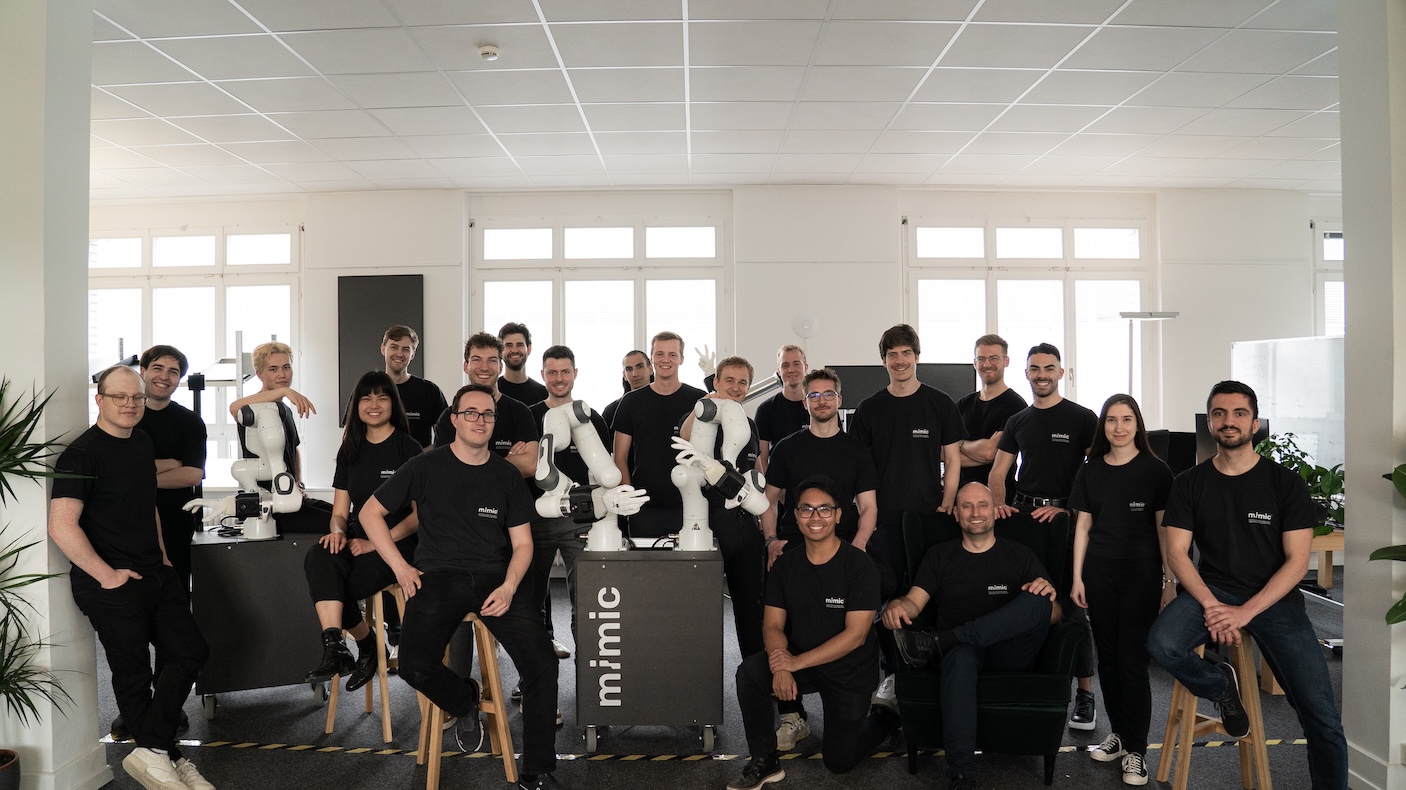Shifting Gears and Navigating Change in the Marketplace Landscape
Change is the only constant, and in the ever-evolving marketplace landscape, adapting to it is crucial. The relentless march of technological innovation, shifting consumer behaviors, and the ever-expanding reach of global markets ensure that the status quo is a fleeting concept. Fail to adapt and you’ll watch your startup get left behind.
To thrive in this environment, adaptability becomes a survival skill. It's about more than just reacting to change; it's the art of anticipating and embracing transformation as an opportunity rather than a challenge. Those who master the skill of adaptation not only stay afloat in the tumultuous sea of change but also ride the waves of innovation, finding success in the unlikeliest of tides. In this landscape, staying stagnant is not an option, and the only constant we can rely on is our ability to adapt and evolve with the ever-shifting tides of the marketplace.
This theme set the stage for this year's Marketplace Conference in Berlin where we assessed the shifts, uncertainties, and opportunities that marketplace founders and investors face. Our thesis this year noted that change and uncertainty often go hand in hand. Think of the last year in public markets, where rapid shifts have become the norm.
But change doesn't stop there.
In the realm of venture capital and within marketplaces, we've witnessed profound transformations that challenge the status quo. At the keynote, we considered, “What if we viewed uncertainty not as an obstacle but as an opportunity? What if we saw change as a catalyst for innovation and adaptation?”
Watch the keynote in the video below.
The Nature of Change
Over the past 24 months, we've witnessed the world change rapidly. As founders, the big question is how to handle the uncertainty that comes with these shifts. Will you be stifled by it, or will you rise to the occasion and turn it into an advantage? To this end, we examined two case studies: Airbnb and Etsy
Airbnb: Lessons from a giant
We began by reflecting on recent changes in the capital markets. Uncertainty still looms large, not least of all when it comes to startup funding. The marketplace business landscape, like all businesses, is affected by macroeconomic shifts, but marketplaces often have the added challenge of dealing with regulatory issues, consumer trust, and network effects.
To truly understand the power of adaptation, we looked at Airbnb. Founded in 2008, right in the midst of the Global Financial Crisis, Airbnb seized upon an opportunity. The founders spotted a gap in the market: the need for affordable accommodation. People were hesitant to spend their limited resources on expensive hotels, and Airbnb's thesis was that they would be willing to pay a more reasonable price to stay in someone else's house.
What began with a modest goal to provide cheap accommodation for attendees of a design conference in San Francisco evolved into a global powerhouse. With over 4 million hosts offering accommodation in more than 100,000 places worldwide, Airbnb's journey is a testament to the power of adaptation.
But Airbnb's story isn't just about finding a niche in a changing market. It's also about navigating regulatory challenges. As the platform grew, it came under scrutiny over hospitality regulations, tax implications, and zoning laws. Instead of shying away, Airbnb invested time and effort into thriving in this new environment.
For instance, in 2016, Airbnb launched the "Friendly Buildings Program," actively partnering with real estate landlords to make it easier for people to offer their apartments on Airbnb within existing regulatory frameworks. This increased supply and helped Airbnb thrive. The company also collaborated with local governments to remit billions of dollars in tourist-related taxes worldwide.
Today, Airbnb is an industry juggernaut, processing over $60 billion in annual bookings and valued at over $80 billion on the stock exchange. Perhaps more importantly, this success is despite some of the regulatory hurdles and legal challenges Airbnb has faced, in addition to high profile incidents around safety and security, that have garnered negative press.
Etsy: A Niche Powerhouse
Etsy, founded in 2005, is another inspiring example. Building a niche marketplace for creators of handmade products was a unique and innovative concept at the time. The founders identified that individual crafters often relied on offline sales for their products and were yet to embrace online selling. Etsy aimed to be the online storefront for these creators, addressing the world of handmade, unique, and vintage products.
Etsy's unique positioning resonated with creators and crafters looking for a central place to showcase their creations. Their obsession with this niche paid off. They managed to build a loyal community of over 7.5 million active sellers worldwide in just over a decade.
In addition to providing a platform for unique, handmade products, Etsy tackled the issue of quality in the vintage market. Quality control was paramount. Etsy was one of the first platforms to implement guidelines for handmade and vintage items, ensuring authenticity and quality. Furthermore, during the COVID-19 pandemic, Etsy demonstrated its adaptability by quickly pivoting its marketing message.
The company positioned itself as the global hub for unique, handmade face masks and other pandemic-related items. In a time of uncertainty and change, Etsy found new opportunities and met the evolving needs of its customers.
Uncertainty as your friend
The examples of Airbnb and Etsy that we've just discussed are two of many where founders embraced uncertainty, adapted their strategies, and seized new opportunities. They treated uncertainty as a friend rather than a foe.
The reality is that the world around us is an uncertain place. There are macro events that individual startup founders have no control over. Yet, these builders keep building despite the uncertainty stemming from global events.
The ability to navigate change is a common thread among successful marketplace founders. They understand that uncertainty can be harnessed as a catalyst for innovation and adaptation. It's not about avoiding change; it's about embracing it and using it to fuel growth.

Embracing the Future
In the face of change, there are exciting prospects on the horizon. Two significant change agents that we at Speedinvest are excited about are shaping the marketplace landscape: AI and the rise of Gen Z.
AI & Marketplaces
Artificial intelligence is poised to revolutionize how marketplaces connect, transact, and create value. It's a change agent that's reshaping how we do business, and we've witnessed an incredible example of AI's potential in the form of ChatGPT, an AI-powered language model. ChatGPT has taken the world by storm, and it's revolutionizing how marketplace entrepreneurs leverage new AI possibilities.
More tangibly, we see several examples emerging under our marketplaces and consumer umbrella:
Personalized shopping
For example, imagine a shopping experience where every click and every interaction is finely attuned to an individual’s preferences. It’s a world of personalized shopping experiences. Netflix, for example, utilizes AI to personalize movie and TV show recommendations. Their recommendation algorithm is estimated to save the company hundreds of millions of dollars annually by reducing customer churn.
With AI recommendations, consumers will be able to access curated product selections that align seamlessly with their unique tastes. This goes beyond mere transactions. In fact, it’s a journey tailored specifically to you.
Advanced search and discovery
Advanced algorithms fueled by natural language processing will bring us search results imbued with context, precision, and relevance. No longer will we be bound by keywords. Instead, we'll navigate a world where AI understands our intent and delivers the answers we seek. Since 2016, Pinterest has integrated AI into its platform to enhance visual search. The platform now allows users to upload images to find visually similar content on the platform.
Dynamic pricing optimization
Dynamic pricing optimization — a concept that was once distant — is now within our grasp.
AI, armed with real-time data, will dance with market trends and consumer behavior, seamlessly adjusting prices to find that sweet spot between profitability and competitiveness. It will be a harmonious symphony of supply and demand, orchestrated by artificial intelligence. A go-to example here is Uber, which uses AI-driven dynamic pricing to match supply and demand. Their "surge pricing" model adjusts ride prices based on real-time conditions, like traffic and demand. This pricing strategy allows Uber to balance supply and demand efficiently.
Supply chain management
In the realm of logistics and supply chain management, AI's influence will be palpable. By predicting demand, optimizing inventory, and ensuring products reach their intended destinations, AI will revolutionize efficiency and that will carry benefits for consumers and sellers alike. Many US companies have capitalized on this especially well. UPS, for example, employs AI for route optimization and package tracking. AI helps UPS drivers find the most efficient routes, reducing fuel consumption, and improving delivery times.
Visual search and AR integration
Visual search, once the stuff of science fiction, will be an integral part of our shopping experiences. With augmented reality, we will walk into stores that exist only in the digital realm, trying on clothes, placing furniture in our homes, all before making a purchase. It's the democratization of touch and feel. It has been great to see the implementation and success of this in many companies.
For example, in 2020, Wayfair, an online furniture retailer, began to offer an AR feature that allows customers to visualize furniture in their own homes before buying. This technology helps reduce the number of product returns and significantly improves the overall shopping experience.
Gen Z as the New Consumer
There is one other seismic shift that is reshaping the world of commerce. That is, the rise of Generation Z, the new consumer force that is driving an unprecedented transformation in the way businesses engage with their customers.
Generation Z, born between the mid-1990s and early 2010s, represents more than just a demographic. They represent a fundamental change in consumer behavior, and understanding their preferences is paramount to thriving in the modern market.
We have identified four significant patterns emerging among Gen Z:
Shift One: Fundamentally new shopping habits:
This generation is the epitome of digital natives. With smartphones as constant companions, Gen Z relies heavily on mobile devices for everything from researching products to making purchases. They’re also heavily influenced by social media with recommendations from peers and influencers holding immense sway over their purchasing choices.
Smartphones are constant companions for Gen Z. A staggering 95 percent of Gen Zers report owning or having access to a smartphone, making mobile devices central to their shopping journey. In fact, 62 percent of Gen Z consumers prefer to buy directly from brands' websites, highlighting their inclination towards digital channels. They have redefined the art of research-driven shopping, with a penchant for comparing options before making decisions.
Shift Two: Livestream shopping
One key notable trend we've seen, especially as early stage investors, is the emergence of livestream shopping — an immersive experience where products are showcased and sold in real-time online broadcasts. Gen Z, drawn to authenticity and interactivity, finds this format engaging and relatable.
Livestream shopping events have seen a surge, with sales estimated to reach $25 billion in 2023, indicating Gen Z's appetite for immersive online shopping experiences. Livestream shopping blurs the lines between entertainment and commerce, and businesses that leverage this trend are finding innovative ways to capture attention and drive sales.
Shift Three: Transformation in retail
E-commerce has become the cornerstone of Gen Z's shopping experience, and businesses must embrace this digital evolution. The boundaries between online and offline experiences are dissolving, requiring a seamless blend of both worlds.
Brick-and-mortar stores are not obsolete; they are evolving into experiential spaces that enhance the overall shopping journey. It's worth noting that 61 percent of Gen Z shoppers prefer to buy from brands that offer an omnichannel shopping experience, demonstrating their demand for consistency across different touchpoints. Personalization and sustainability are non-negotiable for winning Gen Z's loyalty.
Shift 4: Social and environmental awareness
Gen Z is more than just consumers; they're values-driven activists. Brands that align with their values, such as diversity, sustainability, and social responsibility, earn their admiration and support. In fact, a staggering 87 percent of Gen Z believes that companies should help address environmental and social issues.
In this era, businesses are not just judged by their products but by their actions and commitments. It's a symbiotic relationship, where brands with a genuine purpose and commitment to betterment resonate with the socially conscious Gen Z.
Change is an opportunity

The ability to adapt to change and embrace uncertainty is at the core of success for marketplace founders. Lessons from industry giants like Airbnb and Etsy illustrate the power of innovation and adaptation in the face of shifting market dynamics and regulatory challenges.
Moreover, the rise of artificial intelligence promises to revolutionize the way marketplaces operate, offering new opportunities for personalized experiences, advanced search capabilities, and operational efficiency. Additionally, the emergence of Generation Z as the new consumer brings a shift in consumer behavior, emphasizing mobile-first shopping and the influence of peer and influencer recommendations.
As we navigate this shifting landscape, one thing remains clear: Change is not an obstacle but an opportunity. It's a chance for growth, innovation, and the exploration of new horizons. In the spirit of innovation, resilience, and adaptability, we embrace the ever-changing marketplace landscape at the Marketplace Conference, understanding that uncertainty can be our ally, not our adversary.
Want to dive in even deeper? Download the Marketplace Conference 2023 keynote
Want more updates on our portfolio? Sign up for our monthly newsletter and follow us on LinkedIn.













.svg)
